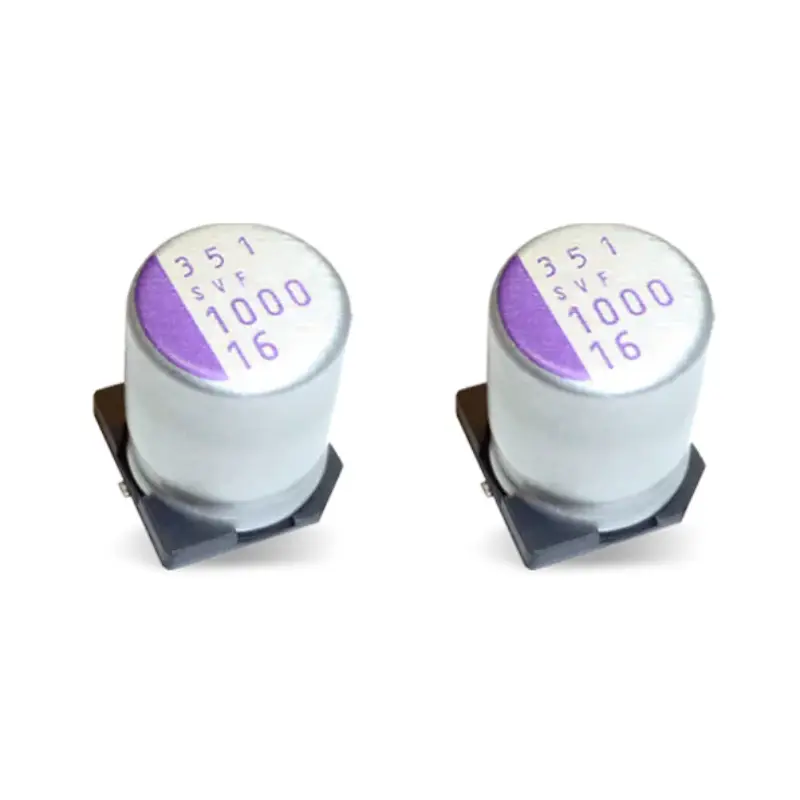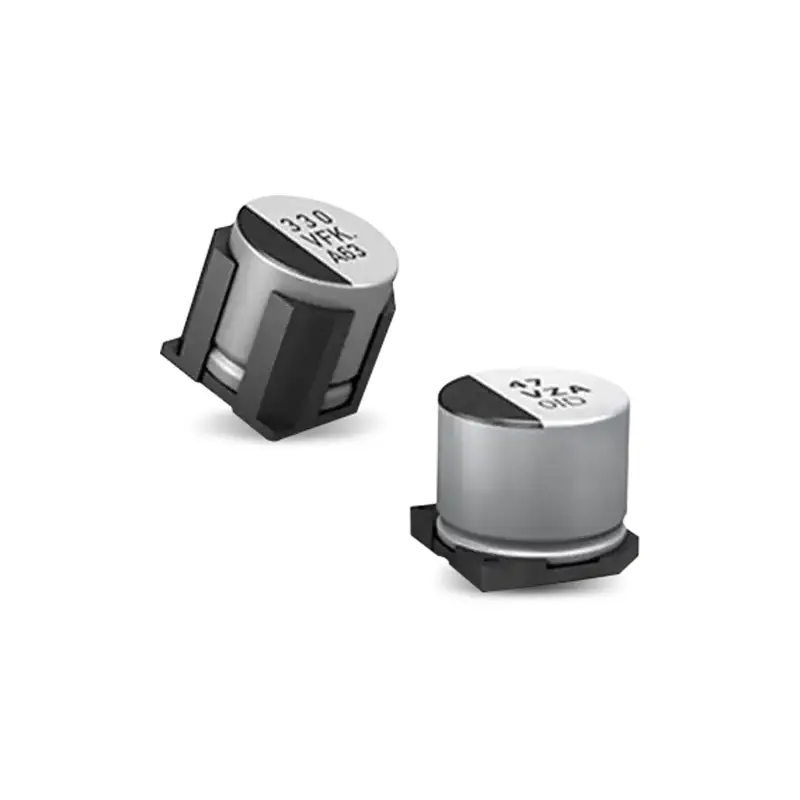Conductive Polymer Capacitors
We offer Conductive Polymer Capacitors, known for their excellent performance and reliability. They utilize a solid polymer electrolyte, enabling high ripple current handling, low ESR, and long lifespan. These capacitors are ideal for demanding applications in power supplies, DC-DC converters, and automotive electronics.
Get Guitar Capacitors with Affordable Prices
Upgrade your guitar’s sound without breaking the bank. Our high-quality capacitors deliver superior tone and performance. Whether you’re a beginner or seasoned pro, our capacitors are the perfect choice. Experience the difference today!

conductive polymer aluminum solid capacitors
We offer conductive polymer aluminum solid electrolytic capacitors, a superior alternative to traditional electrolytic capacitors. These capacitors utilize a conductive polymer electrolyte, providing significant advantages:
- High Ripple Current Handling: Ideal for demanding applications like power supplies and DC-DC converters.
- Low ESR (Equivalent Series Resistance): Minimizes power losses and improves efficiency in high-frequency circuits.
- Long Lifespan: The solid polymer electrolyte enhances stability and reduces drying out, extending the capacitor’s operational life.
- Compact Size: High capacitance values are achieved in small packages, enabling space-saving designs.
- Wide Operating Temperature Range: Suitable for a broad range of operating temperatures, making them ideal for diverse applications.
Choose our Conductive Polymer Aluminum Solid Capacitors for enhanced performance and reliability in your electronic designs.
Conductive Polymer Hybrid Aluminum Electrolytic Capacitors
We offer Conductive Polymer Hybrid Aluminum Electrolytic Capacitors, combining the benefits of traditional aluminum electrolytic capacitors with the advantages of polymer technology.
- Improved Ripple Current Handling: Compared to standard aluminum electrolytics, these capacitors can handle higher ripple currents, crucial for demanding applications.
- Reduced ESR: Lower Equivalent Series Resistance minimizes power losses and improves efficiency in high-frequency circuits.
- Enhanced Stability: The hybrid design provides improved stability over temperature and time, ensuring reliable performance.
- Long Lifespan: The incorporation of polymer technology contributes to a longer lifespan compared to traditional aluminum electrolytic capacitors.
- Cost-Effective Solution: These capacitors offer a balance of performance and cost-effectiveness, making them a suitable choice for a wide range of applications.

Conductive Polymer Capacitor FAQs
what are Conductive Polymer Capacitors?
Conductive Polymer Capacitors are a type of electrolytic capacitor that utilizes a conductive polymer as the electrolyte instead of a liquid or a solid inorganic material like manganese dioxide.
What does conductive polymer do?
In conductive polymer capacitors, the conductive polymer acts as the electrolyte.
Here’s how it functions:
Conducts Ions: The conductive polymer allows ions to move freely within the capacitor. This ion movement is crucial for the capacitor to store and release electrical charge.
Reduces Internal Resistance: Conductive polymers generally have lower electrical resistance compared to traditional liquid or solid electrolytes. This low resistance translates to:
- Low ESR (Equivalent Series Resistance): This is a key advantage, as low ESR minimizes power losses and improves efficiency in high-frequency circuits.
- Improved Ripple Current Handling: The capacitor can handle larger fluctuations in current with less internal heating.
Enhances Stability: The use of a solid polymer electrolyte improves the stability of the capacitor over time and temperature, reducing the risk of degradation and extending its lifespan.
The conductive polymer plays a vital role in enhancing the performance and reliability of these capacitors by facilitating efficient charge storage and minimizing internal losses.
How long do polymer capacitors last?
Polymer capacitors, particularly Aluminum Polymer Capacitors, boast a significantly longer lifespan compared to standard electrolytic capacitors.
Key Factors:
- Operating Temperature: Higher temperatures accelerate aging.
- Ripple Current: High ripple currents generate heat, shortening lifespan.
- Applied Voltage: Operating near the rated voltage can reduce longevity.
Typical Lifespan:
- Under normal conditions, they can last thousands to tens of thousands of hours.
- Manufacturers provide specific lifetime data in datasheets (often hours at a given temperature).
Contributing Factors:
- Solid Polymer Electrolyte: More stable than liquid electrolytes, reducing drying out and extending life.
- Low ESR: Minimizes heat generation, prolonging lifespan.
Maximizing Lifespan:
- Cooling: Ensure adequate cooling to maintain low operating temperatures.
- Ripple Current: Keep within specified limits.
- Voltage: Avoid operating near the maximum rated voltage.
Important Note: Lifespan varies by manufacturer, model, and operating conditions. Always refer to the manufacturer‘s datasheet for the most accurate information.
Can I replace an electrolytic capacitor with a polymer?
In many cases, you can replace an electrolytic capacitor with a polymer capacitor, but it’s crucial to consider these factors:
1. Voltage Rating:
- The replacement polymer capacitor must have a voltage rating equal to or greater than the original electrolytic capacitor.
2. Capacitance Value:
- The capacitance value of the replacement should match the original as closely as possible.
3. ESR (Equivalent Series Resistance):
- Polymer capacitors generally have lower ESR.
- If the original circuit relies on a specific ESR value, using a polymer capacitor with significantly lower ESR might cause unexpected behavior.
4. Leakage Current:
- Polymer capacitors typically have higher leakage current than some electrolytic capacitors.
- This might not be an issue in most applications, but it’s important to consider if leakage current is critical in the specific circuit.
5. Size and Mounting:
- Ensure the physical dimensions and mounting style of the replacement capacitor are compatible with the original.
6. Application:
- For applications requiring high ripple current handling, low ESR, and long lifespan, polymer capacitors are generally an excellent choice.
7. Cost:
- Polymer capacitors are often more expensive than standard electrolytic capacitors.
Recommendation:
- Consult the Datasheets: Carefully review the datasheets of both the original electrolytic capacitor and the proposed polymer replacement.
- Consider the Circuit: Analyze the circuit to understand the specific requirements for the capacitor.
- When in Doubt, Consult an Expert: If you are unsure about the suitability of a polymer capacitor replacement, consult with an experienced electronics engineer.
Sum up
While polymer capacitors offer many advantages, careful consideration and proper selection are essential to ensure compatibility and reliable operation in your specific application.